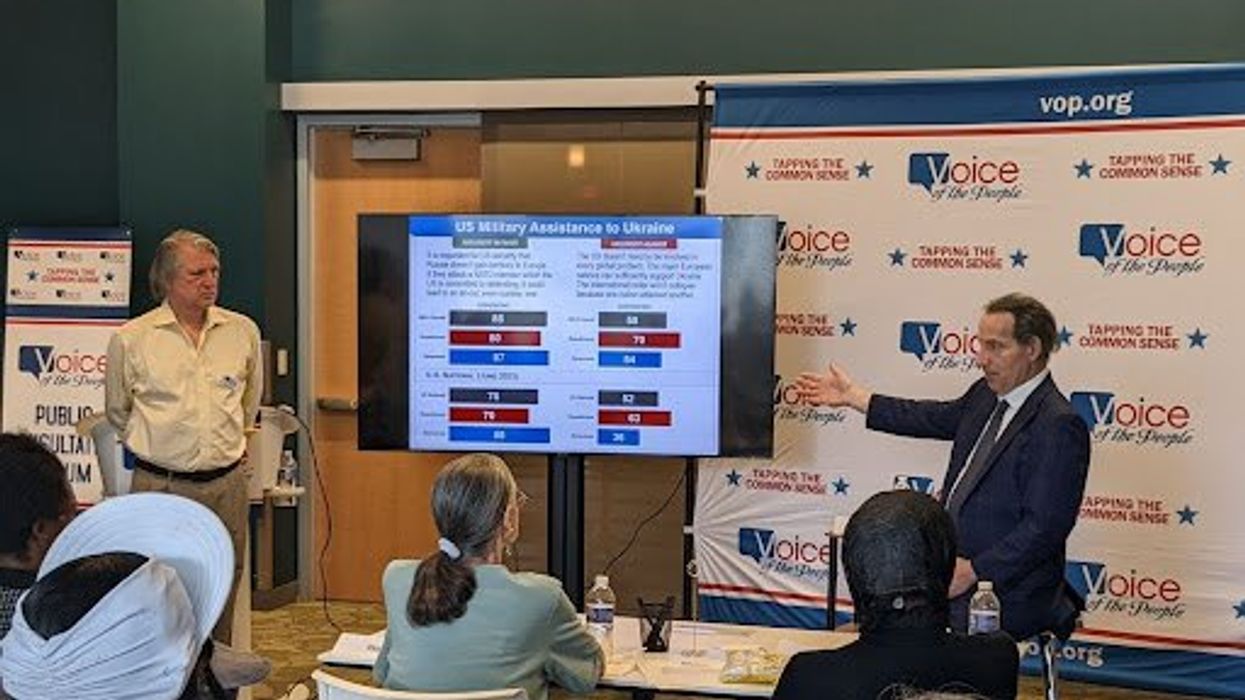Thomas is vice president of Voice of the People and director of Voice of the People Action. Kull is program director of the Program for Public Consultation.
The question of whether to continue aid for Ukraine was the focus of an innovative town hall with Rep. Jamie Raskin this month. The discussion was prompted by a new survey of Maryland’s 8th district that found majorities of both Democrats and Republicans support the U.S. continuing to provide military and humanitarian aid to Ukraine. Majorities also support encouraging Ukraine to engage in peace negotiations.
The survey results were released and discussed at a public consultation forum hosted by Voice of the People in Silver Spring, Md. Raskin and a subset of the respondents who took the survey discussed the topic and survey findings. This public consultation process is designed to give the public a more effective voice in their government’s policy-making. This is the third public consultation conducted with Raskin’s participation.
“I was impressed by how commanding the majorities were for both military and humanitarian assistance to people in Ukraine. It seemed like when people had all the facts and thought it through, they were strongly supportive. I had been operating on that assumption, but I wasn’t really sure. And now I really feel like I am where the bulk of where my constituents are,” Raskin said. “When you are a member of Congress you hear from a lot of people on a whole range of issues. So you are hearing from the most galvanized, mobilized, activated constituencies, but you don’t really have a clear sense of whether that is a representative cross-section of where people are when they think it through. I believe in the wisdom of big crowds of people.”
The survey of a representative sample of 604 district residents was conducted by the University of Maryland’s Program for Public Consultation. The U.S. continuing to provide military aid to Ukraine, including equipment, training, and intelligence, was favored by a bipartisan majority of 64 percent. A majority of Republicans were in favor (58 percent), as were Democrats (68 percent).
The U.S. continuing to provide humanitarian aid to Ukraine for food, shelter, health care, and infrastructure was even more popular with 77 percent in favor. Seven in 10 Republicans (69 percent ) and eight in 10 Democrats (81 percent) were in favor.
At the forum, constituent Mona Galpin explained her point of view: “For the most part we are sending old planes, old tanks, old ammunition. Things that are out of date anyway. If Ukraine can have it and use it before it expires, it gives us manufacturing jobs here to build new planes and technology. I also think that humanitarian aid is very important. These Ukrainians didn’t ask for this. Russia just came in shooting. I try to visualize if it were happening here. What if Mexico decided to take Texas?”
In the lively discussion, local resident April Stafford was concerned about the fiscal implications: “The basic man on the street sees all this money going out to other countries, and we aren’t thinking about GDPs of this country or whatever. We’re seeing we have lost revenue at home, and we are throwing it to other countries. People think of their families first.”
The decision of whether to continue providing military aid was not an easy one for residents. Each of the arguments for and against were found convincing by a bipartisan majority. Survey respondents were given the opportunity to share their thoughts. One respondent who favored aid stated: "The possibility of this war leading to a direct U.S.-Russia confrontation with a possible nuclear threat is quite real. However, further empowering Putin's expansionist authoritarianism is a more proximate danger and must be curtailed before the former scenario is more likely."
Respondents were asked whether “the US should or should not encourage Ukraine to enter into negotiations with Russia, whether or not Russia first commits to withdraw from all of Ukraine.” A majority of respondents (60 percent) said the United States should encourage negotiations, including a small majority of Democrats (55 percent), and over eight in 10 Republicans (82 percent).
Most respondents sympathized with both sides of this debate over whether to encourage Ukraine to enter negotiations, with each pro and con argument found convincing by a bipartisan majority. One respondent who favored the proposal said they did so because "Ukraine will not be able to play the long game in war against Russia." Another, who opposed negotiations, said: "This is a hard one, because we don't want a forever war."
The 604 people who participated in the online survey went through a process called a “ policymaking simulation.” Respondents are provided a briefing, presented with pro and con arguments, and then asked to register their policy views. The content is reviewed by experts on each side of the issue to ensure accuracy. Policymaking simulations are developed by the Program for Public Consultation.
Every public consultation we host focuses on a policy topic, such as the Ukraine War. Citizens are briefed beforehand and come to the forum equipped to have an informed, policy-focused civil dialogue with their representatives.



















Trump & Hegseth gave Mark Kelly a huge 2028 gift